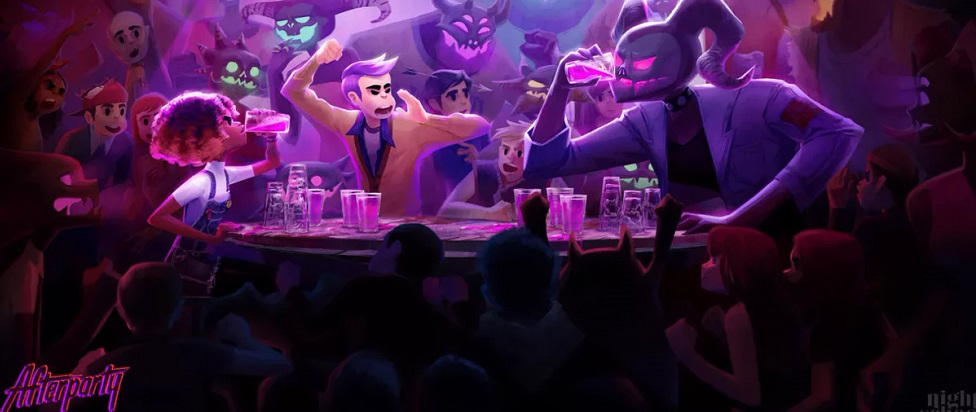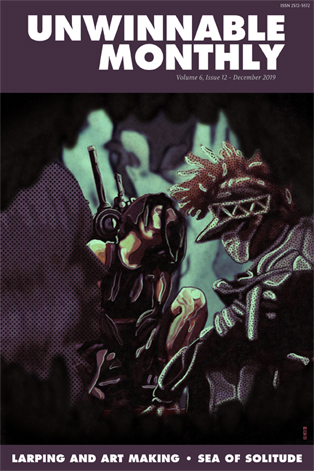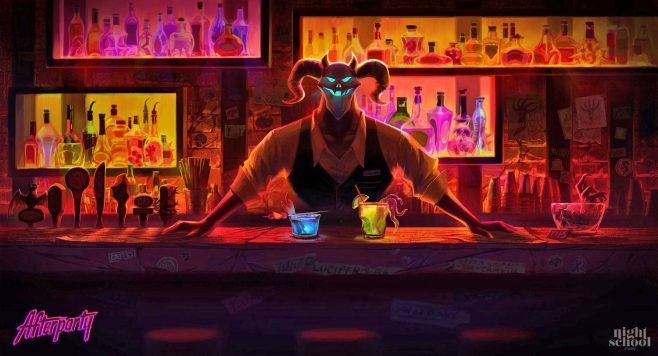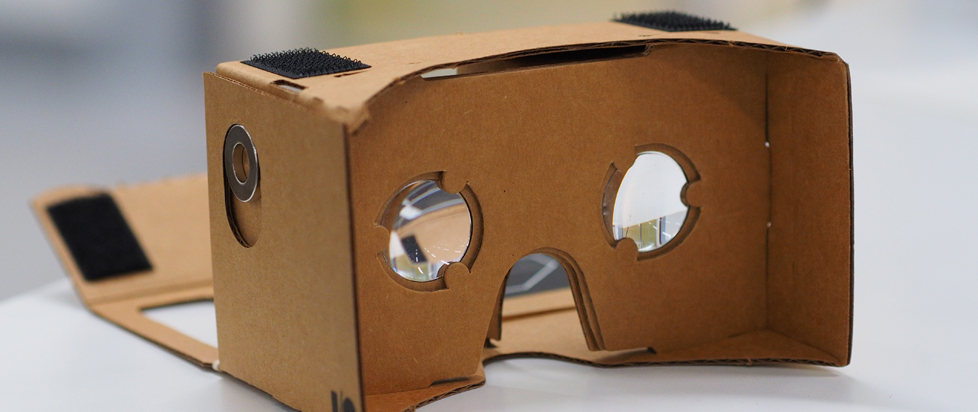
When in Hell, We Do Shots At the Bar
 This column is a reprint from Unwinnable Monthly #122. If you like what you see, grab the magazine for less than ten dollars, or subscribe and get all future magazines for half price.
This column is a reprint from Unwinnable Monthly #122. If you like what you see, grab the magazine for less than ten dollars, or subscribe and get all future magazines for half price.
———
Looking at the world and finding it confusing.
———-
I keep a running list in my mind of apocalyptic scenarios that would make me drink again. It’s a series of events so Earth-shattering that my only choice would be to throw away my sobriety and succumb to relapse.
On that list is waking up in Hell with no memory of my death, no clue what I did to get there, and nothing but eternal torture and damnation in my future . . . unless I can out-drink the devil himself.
That’s the basic setup for the events of Afterparty, the latest game from Oxenfree developer Night School Studios. Protagonists and best friends-for-life Milo and Lola, almost immediately after finishing four miserable years in college, find themselves dead and in Hell, with nothing but pain and misery to look forward to and no clue how they wound up on the wrong side of God. However, in Night School’s version of the underworld, Hell operates on a capitalistic schedule. Like real life, every workday from 9 a.m. to 5 p.m., the souls of the damned are tortured by demons. After business hours, everyone – human and demon alike – drinks together until they have to wake up the next day and do it all over again.
However, shortly after washing up in Hell, Milo and Lola learn of a loophole: if they can beat Satan at a drinking game, they’ll be allowed to leave Hell and granted another chance at life. The duo embarks on an all-night bender, completing various tasks for the citizens of Hell in an attempt to get to and out-drink the Big Cheese.

Admittedly, given my history of alcoholism, I was wary of playing Afterparty. I knew there were ways to play the game without drinking, but I mean, the game’s still about drinking. Spending five-plus hours bombarded with alcohol content isn’t high on my to-do list. More than that, billed as a game full of edgy humor and taboo subject matter, I worried how addiction would be presented in the game. I worried myself, and people like me, would become the butt of shitty jokes. On the other hand, I was a big fan of Oxenfree when it came out in 2016. It was a rare example of a game writing teenagers well, unlike Life Is Strange, which sounds like it was written by people who heard teenagers talk once 25 years ago. Maybe Afterparty would get it right, too. Or maybe it wouldn’t, and I’d still have good material for this column. Fuck it, I thought, I’m going in headfirst, drinking as often as I can in this game. “When in Rome we shall do as the Romans, when in Hell we do shots at the bar.”
So, here’s my alcoholic’s review of Afterparty: It’s really good.
Despite what the game’s marketing leads you to believe, Afterparty is not the hilarious, debauched romp through Hell it bills itself as. It’s . . . very sad. Well, I mean, actually it is a hilarious, debauched romp through Hell. And there are jokes at the expense of addicts, but there are also jokes about murdering children, race, religion, politics and every other subject you’re not supposed to mention at the dinner table. It’s hard to be mad at the game making fun of me when it’s also making fun of, well, everyone. Misery loves company, I guess.
But drinking in Afterparty isn’t just a quirky mechanic, or something to hang the game’s marketing campaign on. Drinking is at the heart of the game’s narrative – specifically what role it plays in our lives. The people in Afterparty’s version of Hell are not particularly stoked to be there and the daily 9-5 pm torture schedule is pretty on the nose as far as workplace metaphors go. They are drinking to numb pain, wind down after a long, monotonous day, and (I’m so sorry) forget their personal demons.
Everyone you encounter in Afterparty is miserable. And rightfully so! Everything around them is terrible; drinking is their only escape. Their internal and external pain, guilt over the sins they committed on Earth and their drinking becomes the biggest bond between the characters of Afterparty, as it’s something they all share. If that sounds familiar, you’ve probably been to a bar. Or AA. Misery loves company.

That point about AA is actually my biggest takeaway from Afterparty. For me, a recovering alcoholic, playing the game felt like going to an Alcoholics Anonymous meeting. Characters in the game shared their pain with me; I commiserated with them over the bad things that have happened to us; and I did my best to give them an open ear and mind in which to vent. That is, quite literally, how an AA meeting functions – you sit and listen to people share their deepest, darkest secrets, pains and fears. You listen to them because you know exactly how they feel. They listen to you for the same reason. The people in that room – and rooms like it, recovery isn’t exclusive to AA – are some of the only people on God’s Green Earth who know how you feel. Misery loves company, and addiction is miserable.
But understanding is not. There’s a certain amount of catharsis in talking to another addict about the things you’ve done or had done to you, in truly believing there’s no judgment, and knowing they understand. More often than not, you’ll find out you don’t have it as bad as you think. What’s surprising is Afterparty nails this in a way I’ve rarely seen in a piece of media, which often portrays addicts as second-rate human beings and addiction as a disease worthy of ridicule and scorn. In Afterparty, you can lend someone your ear, time or both. You can give them a small slice of understanding because you do understand what they’re going through. You share Hell with them – literally and metaphorically in Afterparty’s case.
Before too long, even though in the game I was drinking, After Party was representing me in a way most media intentionally chooses not to. I stopped really caring about the game’s overarching story. Which isn’t to say it’s bad – on the contrary it’s very funny, intelligently written and does some amazing things with its setting – but before too long I started playing Afterparty like an AA meeting, picking it up for an hour at a time and just listening to people. Afterparty seems to understand that, even in Hell, we’re all humans. Fucked up as we may be, addicts have that in common. We’re still humans who just want to be heard, understood, and loved. Misery loves company, but company isn’t always miserable.
Sidebar – It’s worth noting, I’m not sure I’d recommend Afterparty to other people in recovery. The game is about drinking; you see and hear about it a lot. For me, I found a lot to love and felt the game did a good job not demonizing people like me. But triggers are different for everyone, and it’s good to know your own boundaries about what you can handle without putting yourself in danger of relapse or using.
———
Blake Hester is a Kentucky-based writer focusing on the videogame industry. His work has appeared on Polygon, Vice and Rolling Stone. Keep up with him on Twitter @metallicaisrad




